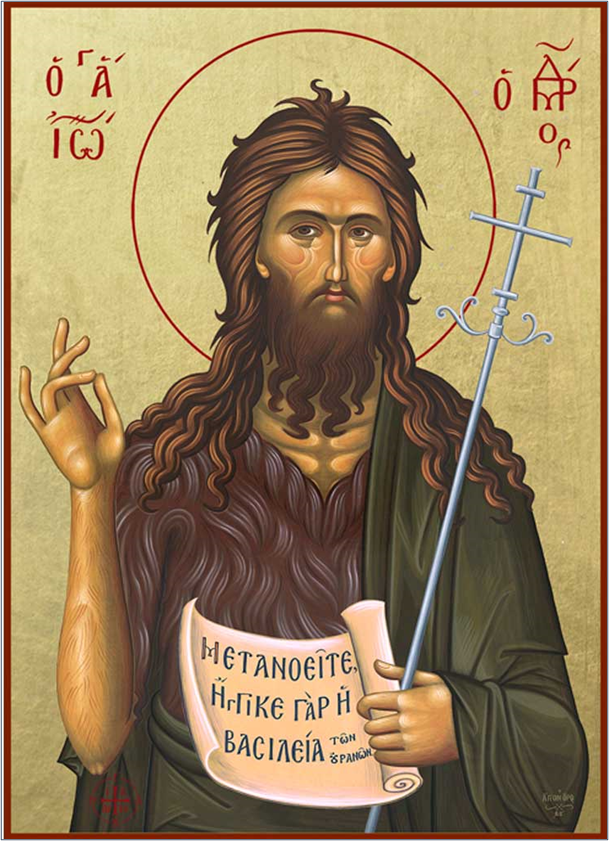Second Sunday of Advent Scripture Readings

Sometimes, when we immerse ourselves into the message of the gospel, we’ve just got to get political. We’re given no choice. I hate the distinction some people draw between religion and spirituality, but there’s a kernel of truth in it. Religion—or, if you’d prefer, religiosity—tends to be backward-looking, while true spirituality is always forward-looking. Throughout the Judeo-Christian Scriptures, one thing is clear: prophets are always dissenters. They never extol the virtues of the status quo. They never advocate a return to a nostalgic, idealized past. They always point to an uncertain, radically transformed, and often perilous future.
John the Baptist is one of those prophets. Not only his preaching, but his very existence serves as a warning against complacency. His demeanor, his clothing, and his ascetic lifestyle suggest the prophet Elijah [2 Kings 1:8]. The return of Elijah was believed to be the precursor of the coming of the Messiah—the instigator of the fearful Day of Yahweh, the consummation of the world.
John’s preaching was a warning against self-satisfaction. He condemned the Pharisees and Sadducees who boasted that they were the privileged ones, the children of Abraham and heirs to God’s promise, safe in their law-and-order world. John warned them that their sense of entitlement and security was illusory. He warned them that their claim to possess the ultimate, unchanging truth was a pipe dream. He told them, in effect, that their pretense of being different from and superior to the rest of humanity was delusional.
John warned them that when they said, “We know what we’re doing; we’ve got this,” they were lying to themselves. When they said, “We can’t imagine that we’d have to stoop so low as to get our hands dirty with the dregs of human existence,” they were separating themselves not only from humanity, but from God.
The baptism of John was a sign. We’ve all heard that John preached a baptism of repentance. But the repentance that John offered was not just sorrow for doing wrong. For John, repentance meant the willingness to change, and that meant a willingness to lay aside old assumptions about how God and the universe work. It meant a willingness to embrace an evolving future where none of the old rules apply. It meant becoming willing to admit, “I don’t got this; I need help.” It meant saying, “Tell me what to do and I’ll do it—no matter what—for I am lost.” Accepting John’s baptism meant giving up old ideas of good and evil, right and wrong, and stepping wholeheartedly into a world of uncertainty. The people who came to John realized that their way of believing, their way of doing things, just wasn’t working.
John was pointing to a future. In fact, that future was no different from the future that all the prophets of old had announced. It was a future they called the Day of Yahweh. Entering into the Day of Yahweh entailed more than just the change of heart that John preached. It required a baptism that John’s could only suggest. The baptism that John prefigured was a change of life itself. We can only experience the Day of Yahweh by dying. Not only our old ideas must pass away, but our old life of self-preservation and self-interest must die. Only then can we begin anew to live by love, which is God. That Love, living and active within us, is what we call the Holy Spirit. John pointed to the coming of that new and divine life of love in the Spirit when he proclaimed the coming of the Christ whose sandals he was not worthy to carry.
The love of God himself broke into our backward-looking, self-satisfied world with the birth of Jesus. The love of God himself transformed the futility and emptiness of human life by Christ’s death and resurrection. The love of God himself filled the emptiness and meaninglessness of your life and mine when we were joined to Christ in our Baptism of faith. The love of God himself is at work within us right now, transforming us into the image of that love, until it’s brought to fulfillment in our own personal Day of Yahweh.
I’ve said it many times: God messes with space and time. God’s past is God’s present is God’s future. The coming of the Savior—the Messiah—was in the beginning, is now, and will be forever. The Holy Spirit is dynamism itself. That’s why the Baptist’s message is timeless. It’s a message calling us to repent of our fearful, backward-looking, narrow, entitled, conservative ways, and to open ourselves to embrace the radically new, different, and unimaginably diverse world that awaits us from the Father, in the Son born among us and raised from the dead into whom we have been baptized, by the power of the Holy Spirit who makes all things new and joins us into one in the love of God himself.
Get articles from H. Les Brown delivered to your email inbox.
